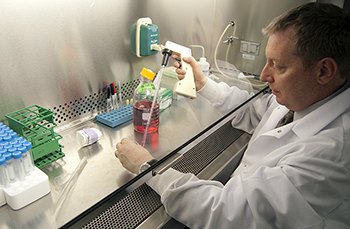
Pioneering research by Professor Dean Burkin is at the center of strategic agreements between the University of Nevada, Reno, Prothelia Incorporated and Alexion, and may lead to a protein replacement therapy for a rare form of muscular dystrophy.
Burkin, a professor and pharmacological researcher with the University of Nevada School of Medicine, and his team discovered that administering laminin-111, a naturally occurring protein, prevents muscle damage in mouse models of muscular dystrophies. The therapy holds promise as a possible treatment for congenital muscular dystrophy in humans. The patented laminin-111 therapy was licensed to Prothelia in 2008.
Now, the three parties have entered into an agreement through which Alexion has an exclusive option to acquire privately held Prothelia and license laminin-111 directly from the University upon the achievement of specified research and development milestones. In addition, through Prothelia’s introduction of Alexion to the University, the University and Alexion have entered into a sponsored-research agreement to accelerate further research on the patented therapy conditioned on the outcome of certain development research to be performed by Alexion.
“The pathway is now there to hopefully get this to a phase-one clinical trial,” Burkin said. “Moving a discovery from the bench to the possibility of a therapeutic application and the treatment of patients is very exciting. I haven’t even been able to sleep.”
“My post docs and students have been working so hard,” he continued. “Their work is represented here.”
“Dr. Burkin has devoted much of his research to the treatment of muscular dystrophy, and this partnership and continued investigational research builds on his work,” said Mridul Gautam, the University’s vice president of research and innovation. “This partnership exemplifies the potential for university-based discovery and industry collaboration to create the possibility of bringing important advancements to the marketplace and ultimately bettering lives.”
